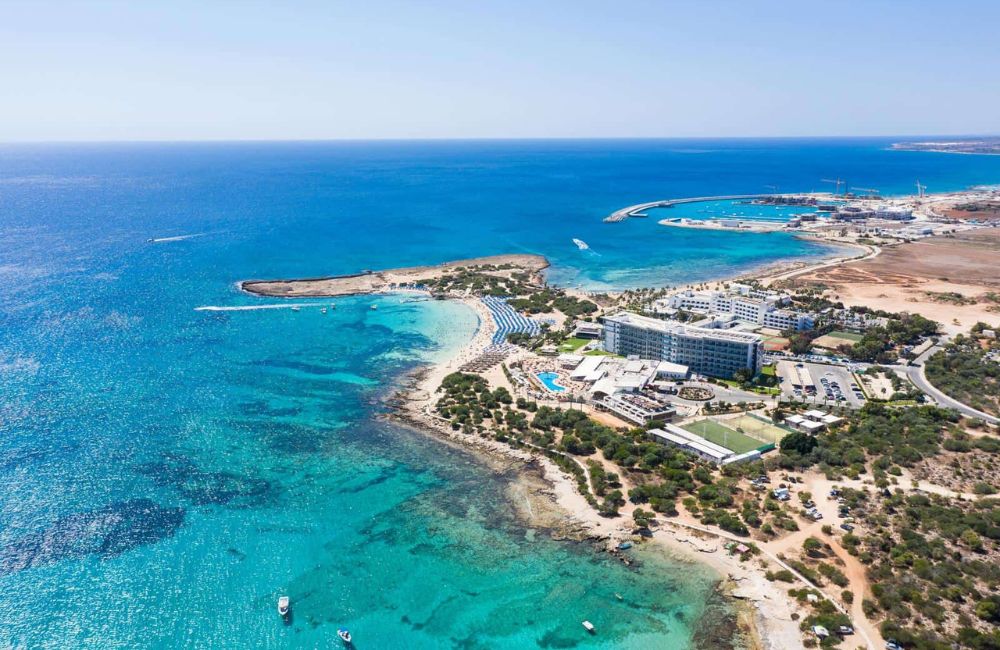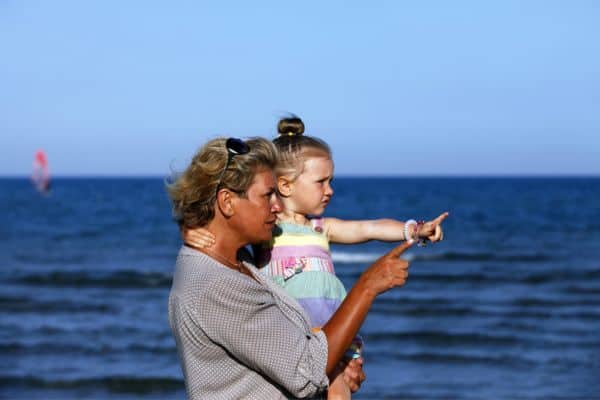Your Complete Guide to Moving to Cyprus with Family

by Hayley
Contemplating the adventure of moving to Cyprus from the UK with your family? Such a significant life change comes with a large number of questions and considerations, especially when it involves relocating to a sun-drenched island with a rich cultural heritage.
This comprehensive guide is designed to navigate you through the essentials of making Cyprus your new home. From assessing the quality of education and healthcare facilities to finding the ideal family-friendly neighbourhood and adapting to the local way of life, we’re here to provide you with the clarity and confidence needed for a seamless transition.
Moving with children introduces its own set of challenges and opportunities. Ensuring their smooth adaptation to a new environment, culture, and school system is paramount. If you need assistance with moving your household belongings from the UK, we are here to help.
1. Family Life in Cyprus
Cyprus is a place where family ties are cherished. The family unit is at the core of Cypriot society, often including extended family living nearby which forms the basis of social circles. It’s not uncommon for adult children in Cyprus to care for their elderly parents, reflecting the tradition of grandparents living with their adult children or newlyweds staying with in-laws.
This deep respect for elders extends into decision-making and the education of younger generations about language, culture, and religion. This strong sense of community, combined with an environment where children are welcome in all social settings, makes family life in Cyprus a desirable prospect for those considering a move.
Local Customs and Traditions
Cypriot culture is rich in customs and traditions. Public holidays such as OXI Day, Greek Independence Day, and Cyprus National Day are significant, with schools and other institutions closing in observance of these dates and the community coming together to celebrate.
Socializing also plays a key role in the Cypriot way of life. Older Cypriot men often gather in local coffee shops or teahouses, while older women typically visit each other’s homes for coffee and conversation, reflecting traditional gender roles. These customs foster a sense of community, making foreign nationals feel welcomed in their new home.
Balancing Work and Family
In Cyprus, a healthy work-life balance is central to family life. The work culture, marked by typical hours from 8:30 am to 5:30 pm five days a week, prizes punctuality, directness, and trustworthiness. Some sectors, such as accounting, legal, teaching and administration provide a better balance between work and family life.
And while traditional gender roles exist, with women expected to take on a majority of household duties, this is changing with some families opting to hire help, allowing for a better balance between professional and family life.
2. Education for Children in Cyprus
For families planning to relocate to Cyprus, education ranks high among considerations. A variety of educational avenues, encompassing public, private, and international schools, are available in the country. The education system is divided into three stages: primary, lower secondary, and upper secondary. Schooling is mandatory for children aged 5 to 15, starting from primary school to Lyceum (middle school) and Gymnasium.
While this system lays a solid educational foundation for children, the instruction language in public schools is primarily Greek, potentially posing a challenge for non-Greek-speaking expatriate children.
Public Schools
Public schools in Cyprus offer free and compulsory education for children aged 5 to 18. Here are some key features of public schools in Cyprus:
- The primary language of instruction is Greek, with English taught as a second language from the first grade.
- Additional languages are available in later school years.
- The academic year is divided into Autumn, Spring, and Summer terms, often starting in September and ending in June.
Kindergarten registration is competitive and should be done well in advance, and there are provisions for special-needs education focusing on inclusion. This inclusive and comprehensive education system makes public schools an attractive option for families moving to Cyprus.
Private Schools
Private schools are another viable option, with most offering English as the language of instruction and following either the British curriculum or the International Baccalaureate. The costs vary based on the child’s age and school’s requirements and may include additional charges for:
- registration
- books
- uniforms
- lunch
- transportation
Private international schools are preferred by many English-speaking expatriates as they offer a familiar language environment and broader opportunities for extracurricular activities. This makes private schools an excellent alternative for families seeking an English-speaking education for their children.
International Schools
International schools are increasingly popular among expat families in Cyprus. These schools provide education primarily in English and often follow globally recognized curriculums such as the British, American, or International Baccalaureate programs. However, the cost of attendance at international schools can be expensive, and expats may need to negotiate education fees as part of their employment salary package.
Despite the cost, these schools offer a familiar curriculum and a globally recognized certification, making them a valuable option for families planning to move to Cyprus.
3. Healthcare for Families in Cyprus
For families considering a move to Cyprus, healthcare is a paramount concern. The country boasts a variety of healthcare facilities, including both state-funded and private hospitals. To access medical care, families should initially seek out a GP, who serves as the main point of contact within the Cypriot healthcare system.
Healthcare facilities in the south are generally considered to be of better quality than those in the Turkish-occupied north of the island. This disparity in healthcare quality has been noted by many observers. In addition to these facilities, there are also various childcare services available, ensuring the well-being of children and peace of mind for parents.
Public Healthcare System
British citizens can access the General Healthcare System (GHS) in Cyprus after obtaining residency approval. This allows them to benefit from essential healthcare services within the country. Those receiving a UK State Pension or an exportable benefit with an S1 form can access public healthcare at the same cost as Cypriot citizens. Employed individuals contribute 2.65% of their gross salary to GHS, while employers contribute 2.90% of their employees’ salaries.
The UK Global Health Insurance Card (GHIC) allows UK citizens to receive healthcare in Cyprus, often at reduced costs or for free. A robust public healthcare system ensures that families have access to essential medical services when they need them.
Private Healthcare Options
Private healthcare services offer an alternative for those not eligible for state healthcare. Expats in Cyprus can choose between international private medical cover and local private medical insurance.
Private healthcare in Cyprus is recognized as less expensive compared to Western countries, while still providing a high quality of medical care. This accessibility to affordable and high-quality private healthcare services makes Cyprus an attractive destination for families considering a move.
Childcare Services
Childcare services in Cyprus cater to a wide range of needs. Families can find:
- Public and private nurseries
- Kindergartens
- Professional nannies
- Childminders
Public kindergartens are income-based and usually more affordable but competitive.
Private kindergartens offer English or Russian language programs and have flexible enrollment throughout the year. Private childcare options like nannies and childminders are also available, typically costing around €10 per hour. The diverse range of childcare services ensures that families can find the right solution to meet their needs.
4. Housing and Accommodation for Families
Another important aspect for families contemplating a move to Cyprus is housing. The country provides a spectrum of choices, ranging from rented apartments – ideal for single individuals or childless couples – to property purchases.
Some areas, such as Larnaca, are considered ideal for families due to their strong community atmosphere and affordable cost of living, while Nicosia, the capital city, offers additional amenities and services that may be beneficial for families.
Popular Areas for Expats
Selecting the ideal residential area is a key aspect of relocating to Cyprus. Here are some popular areas among expats and their unique advantages:
- Nicosia: Popular among expats who are looking to work and integrate into life in Cyprus.
- Limassol: Offers significant job opportunities, particularly in the shipping industry, and is known for its balance between work and family life.
- Larnaca: Offers a slower pace and historical allure, perfect for families seeking a stable environment for raising a family.
Each area has its unique advantages, allowing families to choose a location that suits their lifestyle and needs.
Renting vs. Buying
For families, choosing between renting and buying property in Cyprus is a major decision. Renting offers flexibility, with tenants not bound by long-term commitments and able to adjust rental terms to their needs. On the other hand, buying a property provides a sense of permanency and potential tax benefits. However, homeowners are responsible for all maintenance costs, repairs, and property taxes, which can be substantial beyond the mortgage payments.
Each option has its pros and cons, and the choice largely depends on the family’s long-term plans and financial situation.
Tips for Finding Family-Friendly Housing
Finding family-friendly housing in Cyprus involves considering several factors. Safety should be a priority, ensuring the rental property has secure locks, windows, doors, and an alarm system if possible. The need for ample space is another crucial factor, including an adequate number of bedrooms and storage for children’s items and family hobbies.
Families should also weigh the options between renting apartments, which can be more affordable and require less maintenance but may come with space limitations, against renting houses, which typically offer more space but also come with higher costs and maintenance responsibilities. These tips can help families find a home that meets their needs and provides a comfortable living environment.
5. Leisure Activities and Entertainment for Families
Life in Cyprus extends beyond work and school, with an array of leisure pursuits and entertainment options available for families. From recreational and fitness activities such as gyms, yoga, martial arts, contemporary dance, and drama productions to cultural offerings that include theatres, cinemas, museums, and local festivals, families can enjoy a balanced lifestyle that caters to diverse interests.
Additionally, the island’s culinary scene offers a variety of family-friendly dining options, ensuring that there’s something for everyone to enjoy.
Outdoor Activities
Cyprus’s year-round sunny climate is perfect for outdoor activities. Families can enjoy a variety of beaches, from sandy shores for relaxed days to rocky coves perfect for snorkeling and diving. Nature trails and hiking opportunities abound, allowing families to explore the island’s rich natural environment.
For families seeking adventure, Cyprus offers water parks and forest adventure parks featuring zip-lines that cater to various levels of excitement and age groups. These activities offer families a chance to enjoy the island’s beautiful surroundings and create long-lasting memories.
Cultural Attractions
The rich history and culture of Cyprus provide numerous opportunities for educational and enjoyable outings. Some of the activities and attractions that families can enjoy include:
- Visiting historical sites and ancient ruins
- Exploring medieval castles
- Walking through scenic areas
- Learning about Neolithic settlement sites
These experiences offer a chance to engage with history and learn more about Cyprus’s fascinating past.
For live entertainment suitable for all ages, families can enjoy a variety of performances at Cyprus’s theatres and cinemas. These cultural attractions offer a blend of entertainment and education, enriching the family’s experience of living in Cyprus.
Family-Friendly Dining
Dining out is a popular pastime in Cyprus, and the island offers a range of family-friendly dining options. Restaurants in Paphos, for instance, cater to diverse culinary preferences, including:
- Mediterranean
- European
- Italian
- Japanese
- Greek
- International
- Indian
- Seafood
These establishments focus on creating a welcoming atmosphere for families with children and provide diverse menus to cater to different tastes and dietary preferences. Some restaurants even offer outdoor seating areas for a more relaxed dining environment.
Whether it’s a casual meal at a beachfront café or a special dinner at a high-end restaurant, families can enjoy a variety of dining experiences in Cyprus.
6. Practical Considerations for Moving to Cyprus with Family
Apart from lifestyle aspects, families planning to move to Cyprus must also consider practical factors. These include understanding visa and residency requirements, planning the logistics of moving belongings and furniture, and relocating pets.
Familiarizing oneself with these requirements and planning accordingly can ensure a smooth transition and help families settle into their new life in Cyprus more comfortably.
Visa and Residency Requirements
When planning a relocation to Cyprus, it’s important to understand visa and residency requirements, including obtaining a Cyprus visa or an entry visa if necessary. Following Brexit, UK citizens are treated as third-country nationals and must comply with the respective immigration rules and visa requirements, as Cyprus is not a member of the European Free Trade Association or non eu countries. UK citizens who can prove their residence in Cyprus before January 1, 2021, have rights under the Withdrawal Agreement and require MEU1 or MEU3 residence documents.
UK citizens should apply for a temporary residence permit in Cyprus within seven days of entering, which is valid and renewable annually for 12 months, with the possibility of applying for permanent residence after five years. These requirements may seem daunting, but they are essential steps in establishing a new life in Cyprus and obtaining permanent residency.
Moving Belongings and Furniture
A careful plan is needed when moving belongings and furniture to Cyprus. Options include air freight for small loads, which takes about 3 days, and sea freight, which takes 2-4 weeks for a full container and 4-8 weeks for part load services. While air freight is significantly more expensive, it’s much faster than sea freight, which is a slower but cheaper option.
For safe transportation, a variety of box sizes and packing materials are available, and furniture can be sent with services that include careful export wrapping and packing. By considering these options and planning accordingly, families can ensure their belongings arrive safely in their new home.
Relocating Pets
Pets, as integral family members for many, require meticulous planning when moving to Cyprus. Here are the requirements for bringing pets into Cyprus:
- Pets must be microchipped.
- Pets must be vaccinated against rabies after microchip implantation and at least 21 days before entry into Cyprus.
- An official veterinary health certificate is required for pets entering Cyprus.
- Pets will be subject to inspection upon arrival.
With these requirements met, there is no mandatory quarantine for pets in Cyprus. While relocating pets can be a complex process, it’s worth the effort to ensure that the entire family, including four-legged members, can enjoy a new life in Cyprus.
Are you looking to plan your move to Cyprus?
Moving to Cyprus with your family is a significant decision, but it’s one that comes with a promise of a high-quality lifestyle. Cyprus offers:
- A strong sense of community
- Excellent education and healthcare systems
- A variety of housing options
- A wealth of leisure activities and entertainment options
All of these factors make Northern Cyprus a desirable prospect for families seeking a new home.
Planning your move carefully, considering all practical aspects, and seeking professional advice where needed, can make your transition smooth and stress-free.
With careful planning and consideration of practical aspects such as visa and residency requirements, moving belongings and furniture, and relocating pets, families can ensure a smooth and stress-free transition to their new home in Cyprus.
Recommended Posts

The Essential Moving to Cyprus Checklist – Your Complete Guide
Thursday, 3rd October 2024

Guide to Moving to Cyprus from the UK for Work
Thursday, 11th July 2024

The Complete Guide to Moving to Portugal with Family
Wednesday, 23rd April 2025






